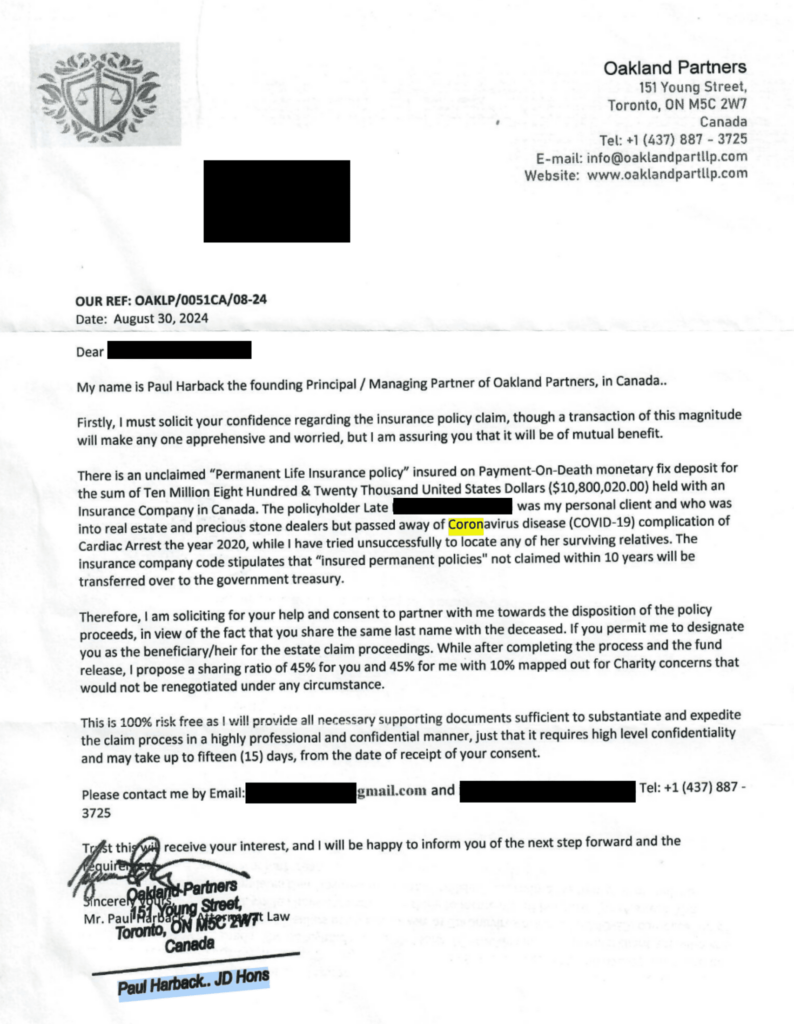At EstateCo, we're dedicated to helping heirs navigate legitimate estate claims while protecting them from increasingly sophisticated inheritance scams. Our team recently analyzed a suspicious letter claiming to offer a multi-million dollar inheritance, which exhibited numerous red flags. Learn how to protect yourself from inheritance fraud and why working with reputable firms like EstateCo is crucial for safely managing potential inheritances.
September 17, 2024
~5 min read
At EstateCo, we’re committed to connecting heirs with legitimate at-risk properties, but we’re equally dedicated to educating our clients about the dangers of scams in our industry. Unfortunately, the rise in sophisticated scams has made it increasingly difficult to distinguish between legitimate inheritance claims and fraudulent attempts. They often use official-sounding language, legal jargon, and fabricated stories to convince someone that they’re about to inherit a large sum of money.
Recently, someone within the EstateCo network shared with us a letter they received from a Paul Harback at an Oakland Partners in Canada. The recipient of the letter came to us before taking any action, allowing us to take some preliminary steps to validate its authenticity. Here is a copy of the letter they received:

Our research team quickly determined that the letter was riddled with potential red flags. While we cannot definitively label it a scam — the letter immediately raised several significant concerns we wanted to share.
Understanding The Anatomy of Estate Management Scam
Here are some tips and suggestions to help you identify potential warning signs in similar situations:
Unsolicited Communication
In the letter we reviewed, the sender opened with:
“Firstly, I must solicit your confidence regarding the insurance policy claim…”
Receiving unsolicited communication about an inheritance or life insurance policy is a common tactic used by scammers. Legitimate estate firms don’t reach out randomly with such claims. If you haven’t previously heard of the estate or the company, proceeding with caution is essential.
Pressure to Act Quickly
The letter also creates a sense of urgency with statements like:
“The insurance company code stipulates that “insured permanent policies” not claimed within 10 years will be transferred over to the government treasury…”
And:
“It may take up to fifteen (15) days, from the date of receipt of your consent…”
Be wary of any situation where you’re pressured to act fast. While some estate matters are time-sensitive, arbitrary deadlines without context are often a red flag. Legitimate companies typically provide ample time for you to verify the claim and seek independent advice.
Requests for Upfront Fees
Though not explicitly mentioned in this particular letter, it’s common for fraudulent entities to request fees in advance for “processing” or “legal” costs. Authentic firms involved in estate distribution don’t ask for money upfront before releasing funds. Always be skeptical of anyone requesting payment before an estate is settled.
Poor Grammar and Typos
The letter in question included awkward phrasing:
“…who was into real estate and precious stone dealers but passed away of Coronavirus disease (COVID-19) complication of Cardiac Arrest the year 2020…”
Poor grammar, odd phrasing, or unnecessary details can be an indicator that the communication may not be legitimate. Professional companies take the time to ensure their materials are well-written and polished, and mistakes like these should be cause for concern.
Suspicious Contact Information
The letter provided a Gmail address for contact:
“Please contact me by Email: [NAMEREDACTED]@gmail.com…”
Be cautious of correspondence from a free email service like Gmail or Yahoo. Reputable businesses use professional email addresses and provide verifiable contact information. In this case, a quick search found no legitimate record of the sender’s name or company, which is another red flag.
Too Good to Be True
In the letter, the sender mentioned a large sum of money:
“The sum of Ten Million Eight Hundred & Twenty Thousand United States Dollars ($10,800,020.00) held with an Insurance Company in Canada…”
A massive inheritance from an unknown source can be an enticing offer, but it’s often a sign that something isn’t right. Large, unclaimed sums from distant or unknown relatives are extremely rare. If it seems too good to be true, it likely warrants further scrutiny.
Lack of Verifiable Information
The letter vaguely referenced a deceased individual:
“The policyholder Late [NAME REDACTED]… I have tried unsuccessfully to locate any of her surviving relatives…”
When dealing with potential inheritance claims, legitimate firms will provide clear, verifiable information about the deceased, including publicly available records and legal documentation. In this case, the lack of specifics and the difficulty in verifying the sender’s identity raised concerns.
Suspicious Beneficiary Designation
In the letter, the sender made an unusual request:
“I am soliciting for your help and consent to partner with me towards the disposition of the policy proceeds, in view of the fact that you share the same last name with the deceased.”
This is a major red flag. Legitimate inheritance claims don’t hinge on such weak connections as sharing a last name with the deceased. Real estate or life insurance policies require verifiable legal documentation to establish rightful heirs, not vague partnerships. If you’re asked to be designated as a beneficiary simply because of a shared last name, it’s a clear sign that you should dig deeper and verify the legitimacy of the claim.
Additionally, the letter proposed a “sharing ratio” of the funds, which is highly unusual in real estate and insurance matters.
“While after completing the process and the fund release, I propose a sharing ratio of 45% for you and 45% for me with 10% mapped out for Charity concerns that would not be renegotiated under any circumstance.”
Be cautious when claims involve arrangements that divide inheritance proceeds, especially when paired with requests for your consent. Legitimate companies typically won’t offer such deals, and this should be treated as another potential warning sign.
Other Potential Red Flags Discovered
After a first pass, our research team dug deeper and uncovered several more areas of concern regarding the letter we reviewed:
- The company address was incorrect
- There was no record of the lawyer named in the letter
- The company listed appears to be a fictitious
- The company’s website was a near-exact copy of a legitimate Australian law firm’s site
- The phone number matched other suspicious websites
EstateCo: Transparency, Professionalism, and Trust
At EstateCo, we specialize in connecting rightful heirs with unclaimed or at-risk assets — and we do it with transparency, professionalism, and a commitment to your security. Our team is highly skilled in estate management and knows how to separate real opportunities from potential scams.
When you partner with us, you can expect:
Thorough Research
We verify every detail and cross-reference public records to ensure the legitimacy of any claims.
Expert Guidance
Our experienced team will guide you through the process step by step, answering any questions you have along the way.
Complete Transparency
We never pressure you into acting quickly or in secrecy. Our process is open, transparent, and focused on protecting your interests.
Clear Fee Structure
At EstateCo, there are never any hidden costs or upfront fees.
Independent Verification
We encourage independent verification of all claims so you can feel confident in the authenticity of the process at every stage.
If you receive a suspicious inheritance notification with some of these telltale signs, don’t engage. Instead, report it to the appropriate authorities and seek advice from trusted legal professionals. By staying vigilant and working with reputable firms like EstateCo, you can protect yourself from inheritance scams and ensure that any legitimate inheritances are properly claimed and distributed.
Received a Suspicious Letter? Let EstateCo Help
If you’ve received a letter about an unexpected inheritance, don’t take any chances. Contact EstateCo today, and we’ll run preliminary research to verify its legitimacy—for free. Protect yourself from scams, and let our experts guide you through the process with transparency and professionalism.
Get your free consultation today!




